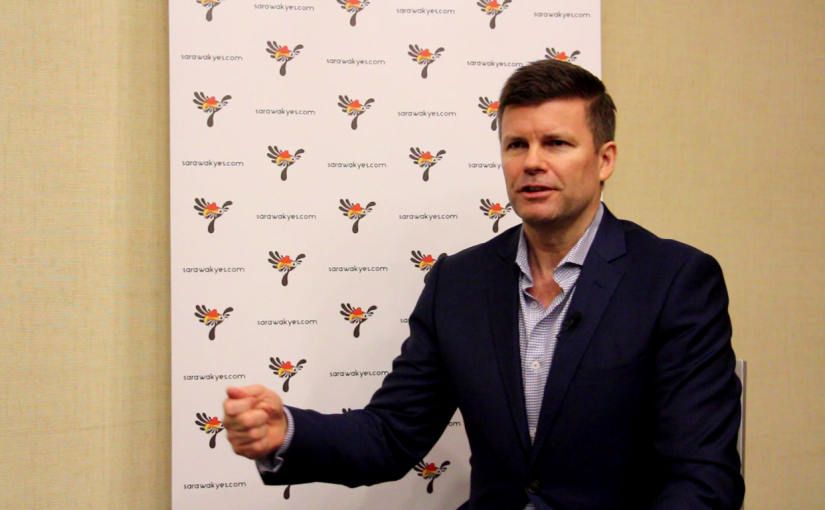At the World TVET Conference 2015 in Kuching, SarawakYES! caught up with John Peterson, Managing Director of the Best Practice Group of Companies in Australia to get his expert insights into vocational education and career opportunities. He is also the author of “The Entrepreneurs Guide to Business Mastery”.
Q: What are some of the questions people should ask before considering a vocational career?
A: When you’re thinking about your career, you must ask yourself what you like to do. It is important to be willing to try a few things. If you’re certain you like something then you should go and do it. If you’re not sure, then try anything and keep trying and … if you change your mind, that is not a failure, that is a lesson to build on your knowledge bank. Your knowledge bank will help you to finally one day work it out. I know many people who did not know what they wanted to do for a long time, into late 20s, even 30. So the best thing is to just try and if you can find something that you really personally like then follow that.
Q: Can you list some career options for those with a TVET background?
A: It’s quite incredible how your career can become something quite amazing if you just start with one skill. One skill can become so much more. It does not matter if you start as a carpenter, or a tiler, or a plasterer, or a painter, anything. That skill base does two things – the first thing it does is it teaches you how to become an asset to yourself and to your employer. Then you start to evolve your base of being an asset into possibly being a specialist. If you become a specialist you become very valuable, and the more you specialise the more valuable you become. You don’t have to actually be a brain surgeon to end up earning lots and lots of money. A normal trade can pay you very, very, well, and you can be held in very high regard with great respect and great esteem.
Secondly … don’t just learn something, learn it and learn it very well. And then from there you will start to unconsciously evolve your other skills. You will become better at other things through becoming a specialist, through your tenacity, through your dedication, you will actually learn some other things, and maybe you don’t notice it initially, but you are becoming a professional. Now a professional person is a state of mind, it’s an attitude, it’s a level of determination, consistency, ethics and values – these things are incredibly valuable and an asset for many industries. So you can then start to transcend other industry barriers and boundaries, it’s not so difficult to then, if you want to make a change and learn another skill, you can do that.
Q: Does having a certain skill depend on job market demands, or do you think people need to do something they like first and decide later on?
A: Young people can start in any industry, even if it’s not something that they like. I was cleaning restaurants and supermarket floors for my first real job. Now, it was not very exotic, it was not where I wanted to end up, but I started to learn to respect the job that needed to be done. So you build a work ethic and that will not limit you. I think what happens is we can easily tell ourselves that our local economy, our local industry, our local supply and demand is going to stop us or restrict us in our career – that is a mindset, that is not a truth.
Q: Can you explain why these career options are rewarding ones and the careers to choose?
A: A great example, in Australia today if you are a carpenter, an electrician, a plasterer, a plumber, these types of trades are earning very, very, good income, they are in high demand. And if you think about the continuing expansion of our population worldwide – even if the oil and gas industry or the mining industry may pay more money, as one example – what will follow is that economic boom brings housing development and local demand for all of those things.
So over time what might seem to be a trade that is not very prestigious or honourable, is in fact going to be something very, very valuable. What’s also interesting is in learning those skills you also start to discover other things that you may like that you weren’t even clear on.
Q: How do you change the perception of these career options, what would you make them think about, or how can you change the perspective of parents?
A: The most limiting factor to success in vocation, in careers, is your self-esteem and your self-belief. It is not your skills and it is not your parents. So if you don’t believe in yourself, nobody else will. So the most important thing to do is to discover your passion and be willing to try many things and not necessarily be clear. Your passion, it will find you or you will find it, as long as you don’t give up.
So from a career planning point of view, if you’re not sure what you want to do, then learn how to do things, learn on the job, get skills, get training, and learn how to become better at many different things until you find something you love. You may be surprised at what you love.
Now, the second part of that are your parents. The social pressure to be able to say as a parent that my children are doing this or doing that, that is something that many cultures struggle with and they put pressure on their children. So we really need to come back to family values and we need to say to our parents, ‘surely you want me to love what I do, and if I’m going to love what I do, you have to encourage me to do what I love, not something you want me to do’. So you must love something and you must encourage your family to appreciate that passion.
Q: You mention passion, and we know businesses are driven by passion. Can you talk about how to choose a career or a course that can lead towards running a business or being an entrepreneur?
A: I take business owners in every industry in Australia and I teach them how to become entrepreneurs. And they learn this. It’s not natural for everybody, and it doesn’t have to be. It’s the core skills that evolve. You cannot possibly run a business based on a university degree. That’s not a business, that’s some theoretical knowledge – it’s valuable, but it’s theoretical. The practical skills are one step ahead to becoming an entrepreneur. You actually physically have to do something to get paid. So if you can learn a skill or a craft or a trade – you don’t have to be a doctor or a professor – you can take those skills and harness them into a business. And once you are a business owner, then really the world is you oyster, it’s about how you think.
Q: Is there anything else you would like to share?
A: I wrote this book to try and help inspire people to think about what’s possible for them. So if you think about somebody starting their career, I find that this book can really change the way they think, that they can commit to a learning journey for themselves. If we want to have more than we’ve got, then we have to be willing to become more than we are. If we want to experience a reward tomorrow that we cannot achieve today, then we cannot go and do the same things tomorrow that we’ve always done. And this is the power of learning, and learning on the job, because on the job you’re getting paid and you’re also sharpening your knowledge.




